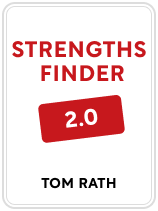

This article is an excerpt from the Shortform book guide to "StrengthsFinder 2.0" by Frederick Brooks. Shortform has the world's best summaries and analyses of books you should be reading.
Like this article? Sign up for a free trial here .
What’s the problem with modern self-improvement? How does the StrengthsFinder 2.0 assessment address this shortcoming?
StrengthsFinder 2.0 by Tom Rath is a companion book to Gallup’s widely-used online strengths test—formerly called StrengthsFinder 2.0 and now called CliftonStrengths. This isn’t your average personality test: Rather than helping you pinpoint your weak spots, the Strengths Test helps you find your greatest strengths. Tom Rath, who’s written several bestselling self-help books (including How Full Is Your Bucket?), argues that, to be truly successful, you must channel your energy toward capitalizing on existing talents rather than working to eliminate weaknesses.
Here’s our overview of the companion book, including a description of each strength and an exercise for you to consider your top five.
Tom Rath’s StrengthsFinder 2.0
When you take the Strengths Test, you’ll be tested for 34 distinct abilities and discover your top five (or 10, depending on the version of the test you take) abilities. Then, by reading StrengthsFinder 2.0 by Tom Rath, you’ll glean further information about your abilities and how to leverage them to succeed.
The Problem With Modern Self-Improvement
Rath asserts that the problem with modern self-improvement is that it focuses on weaknesses. However, he claims that you can’t overcome every weakness by simply trying hard enough. Instead of investing time and energy into canceling out your weaknesses, focus on ways to build on your innate abilities. To focus on strengthening your innate abilities, first identify them. This is where the Strengths Test comes in.
The 34 Strengths
We’ve grouped the 34 innate abilities in the Strengths Test into four categories. We cover most of these abilities individually within the categories, but we’ve also combined some of Rath’s abilities that are similar to each other (we’ve indicated clearly where we’ve done this). You’ll find Rath’s original ability name in parentheses.
Action-Oriented Abilities
These nine abilities involve action or forward movement.
Ability #1: Doer
Rath writes that if you’re a doer (Achiever), you’re innately driven to accomplish goals. When you don’t accomplish a goal, you feel bad, and when you don’t have a goal, you find a new one to strive toward. An example of a doer is a runner who keeps entering longer and longer races to attain a feeling of accomplishment.
Ability #2: Catalyst
As a catalyst (Activator), you want to put plans into action right away, writes Rath. You dislike endlessly ironing out details and would rather try something and fail so that you can learn from the experience. For example, a catalyst teacher might test a new exercise in the classroom right away and see how it goes instead of tweaking it until it’s perfect.
Ability #3: Leader
As a leader (Command), you take a firm stance on issues and communicate your opinion clearly and fearlessly, asserts Rath. You confront difficult situations head-on, which means others often see you as a leader. For instance, a leader political strategist wouldn’t hesitate to tell their candidate why their platform won’t win them the election.
Ability #4: Contender
If you’re a contender (Competition), you’re motivated by the desire to win and beat others, though you’re not necessarily mean or unpleasant about it, claims Rath. Your sense of success is based on how well you do compared to others. For example, a contender salesperson is motivated to achieve by the desire to sell more than their colleague.
Ability #5: Orderer
Rath says that as an orderer (Discipline), you believe in structure and routines as enablers of success. You like imposing order on the world through organizational systems and processes. An orderer restaurant manager might create a system to track employees’ schedules to increase restaurant efficiency.
Ability #6: Student
According to Rath, if you’re a student (Learner), you love learning and become discontented when not actively educating yourself and building your skills. You always want to grow and improve, and the outcome of your learning matters less than the process. For instance, an urban gardener attends conferences on gardening because they’re interested in the act of expanding their skill set, rather than in the gardening skills they’ll acquire.
Ability #6: Student
According to Rath, if you’re a student (Learner), you love learning and become discontented when not actively educating yourself and building your skills. You always want to grow and improve, and the outcome of your learning matters less than the process. For instance, an urban gardener attends conferences on gardening because they’re interested in the act of expanding their skill set, rather than in the gardening skills they’ll acquire.
Ability #8: Commitment-Keeper
Rath claims that as a commitment-keeper (Responsibility), you take your responsibilities seriously and must complete them fully and to everyone’s satisfaction to feel good. You never make excuses when something goes wrong and instead work double-time to make amends for errors. A commitment-keeping customer service rep might personally continue to update a customer on the status of their order until it’s fulfilled.
Ability #9: Fixer
According to Rath, as a fixer (Restorative), you enjoy fixing practical problems. You’re good at identifying underlying issues and finding solutions. A fixer movie producer might thrive when actors or locations fall through and they need to find replacements, for instance.
Cognitive Abilities
These 11 abilities pertain to the way you think.
Ability #1: Logician
If you’re a logician (Analytical), you want to find logical explanations and understand why something is the way it is, writes Rath. You like digging into claims to prove or disprove them, and you love using data to back up your research. A logician business consultant would want to understand why a business designed its processes a certain way and verify if those processes are efficiently using data, for example.
Ability #2: Organizer
Rath says that as an organizer (Arranger), you excel at organizing and planning and can hold many items in your head at once while you figure out how to best arrange them. You can think on your feet and make short-notice changes to improve your organization based on new information. An organizer wedding planner would cope with unexpected bad weather at an outdoor wedding by quickly shifting the celebration indoors and making the necessary logistical adjustments.
Ability #3: Historian
If you’re a historian (Context), you’re good at learning about the history or background of a person or decision so that you can understand it now, asserts Rath. You always look to the past to explain the present and to inform how to proceed. For instance, a historian city planner might seek to understand how space was used in a city in the past to understand how to use that space now.
Ability #4: Cautioner
According to Rath, if you’re a cautioner (Deliberative), you’re cautious and strive to understand the full context of a decision before you make it so you can pursue the best route. You’re risk-averse and only chime in when you’re confident you know what you’re talking about. A cautioner supervisor might not give a subordinate a task until the supervisor knows it’s necessary and is sure the subordinate is the best person for the job.
Ability #5: Corraler
As a corraler (Focus), you’re laser-focused on goals and help keep others on track toward achieving them, argues Rath. You consistently realign yourself and others with these goals and can easily deprioritize items that don’t move you closer to them. For example, a corraler might keep bringing colleagues back to the main purpose of a meeting when they get off-topic.
Ability #6: Prophet
If you’re a prophet (Futuristic), you have a great sense of future possibility, states Rath. You envision future scenarios clearly and often think in hypotheticals. A prophet textile designer might envision many future uses of a new fabric.
Ability #7: Conceptualist
Rath claims that as a conceptualist (Ideation), you love coming up with new ideas and novel connections. You delight in thinking and devising new concepts. A conceptualist performance artist might devise an entirely new form of dance by reflecting on and connecting distinct ideas.
Ability #8: Researcher
Your researcher (Input) ability means you love acquiring new knowledge and take time to research and learn to add to your understanding, asserts Rath. Facts excite you, and you collect them for the fun of it. For example, a researcher intern might go above and beyond her research assignment because she’s interested in the topic.
Ability #9: Professor
As a professor (Intellection), you love thinking and problem-solving, says Rath. You’re good at dedicating yourself to long-term projects that require deep consideration. You function best when left alone with your thoughts and given the time to sort them out. For example, a professor clockmaker would dedicate a long period of solitary time to fixing a broken antique clock.
Ability #10: Tactician
Rath claims that as a tactician (Strategic), you’re great at thinking through possible outcomes and choosing the best one. You can predict others’ behaviors and tailor your response to those behaviors to ensure a positive outcome for yourself. A tactician lobbyist would think through all possible ways to approach a politician and select the approach most likely to persuade them to support a specific policy.
Ability #11: Adapter
If you’re an adapter (Adaptability), you live life in the moment and can respond gracefully to disruptions, states Rath. You thrive in uncertain environments with constantly changing demands on your time. An adapter babysitter would cope gracefully with a child who won’t go to sleep by inventing a game or story.
Belief-Based Abilities
These six abilities stem from your beliefs and worldview.
Ability #1: Valuer
According to Rath, your valuer (Belief) ability means you’re motivated by your values. You won’t do something if you don’t feel it’s important. You have a great sense of responsibility toward others and take your ethics into account when you make choices. A valuer carpenter might choose to only work with sustainable or recycled materials.
Ability #2: Liaison
As a liaison (Connectedness), you sense the interconnectedness of the universe deeply, claims Rath. You believe your actions have meaning and an impact on others and that all humans are connected. This belief gives you a high sense of responsibility toward others. A liaison fitness instructor might stay after class to provide specific instructions to students because they think they can make a big difference in their lives.
Ability #3: Equalizer
The equalizer (which encompasses the Consistency and Includer abilities) believes everyone should be treated equally and have the same opportunities, contends Rath. As an equalizer, you work to include everyone in decisions and activities. You respect everyone’s right to be heard, and you advocate for the underrepresented. An equalizer restaurant worker might represent their colleagues when addressing a safety issue with their boss.
Ability #4: Peacemaker
If you’re a peacemaker (Harmony), you think success arrives when people set aside their ego-driven opinions and come to a consensus, claims Rath. You’re willing to change your approach or beliefs if it helps the group achieve a goal, and you try to get others to do the same. For instance, a peacemaker corporate executive would be OK not having their suggestion on a project implemented if it meant maintaining the peace and getting the project done.
Ability #5: Optimist
Rath believes that as an optimist (Positivity), you always see the best in every person and situation. You make the people you’re around happier, too. An optimist nurse would spread joy to all patients by speaking to them positively about their healing progress and how well they’re coping.
Ability #6: Believer
If you’re a believer (Self-Assurance), you have confidence in your judgment, abilities, and understanding, and this allows you to act decisively, asserts Rath. You understand intuitively that only you can make the best choices for your life. This confidence attracts others to you. A confident advertising executive might advise a client to run an outside-of-the-box campaign because they’re certain of the strength of their judgment.
People-Oriented Abilities
This last category contains six abilities based on how you see and interact with others.
Ability #1: Cheerleader
The cheerleader ability (which encompasses the Developer and Individualization abilities) means you’re great at finding others’ strengths and unique traits and helping them develop them, claims Rath. A cheerleader camp counselor would assign campers to activities they know they’ll excel at.
Ability #2: Storyteller
According to Rath, as a storyteller (Communication), you’re excited by communication in all forms: written, verbal, and so on. You’re good at bringing ideas to life through communication and can weave an engaging story around any concept. You like capturing the attention of others. A storyteller astronomer might find ways to communicate their complicated research findings via an exciting story.
Ability #3: Commiserator
When you have the commiserator (Empathy) ability, you understand the needs and feelings of others, states Rath. You can put yourself in their shoes and communicate to them how well you grasp their situation. A commiserator plumber would communicate to the client that they understand how upsetting plumbing issues can be.
Ability #4: Intimate
As an intimate (Relator), you love developing strong connections and establishing intimacy, says Rath. You prefer to invest deeply in a relationship than to form many superficial ones. An intimate flight attendant might prefer to get to know one fellow attendant and one pilot well instead of getting to know all colleagues a little.
Ability #5: Celebrity
If you’re a celebrity (Significance), you’re motivated by the desire to be important and recognized by others, argues Rath. You like being able to put your personality and strengths on display in your work and usually behave independently. A celebrity clothing designer might try to create a totally unique design that garners attention.
Ability #6: Befriender
Finally, as a befriender (Woo), you want to meet and gain the good opinion of as many people as possible, Rath suggests. You’ll talk to every stranger you meet in the hope that they’ll like you and enjoy your company. You don’t let these initial conversations drag on, however—you leave to converse with a new stranger as soon as you’ve won someone over.
Exercise: Consider When and How to Strengthen Your Top Five Abilities
Pinpoint situations in which you can both build upon your top five abilities and use them in novel ways.
- Now that you’ve reviewed all 34 abilities tested for in the Strengths Test, write down the five abilities you feel best describe you.
- For each ability, briefly describe a specific situation in which you often use that ability and how you currently use it. This can be in the workplace, in the home, or in your social life. (For instance, you might use your logician ability to regularly conduct high-quality analyses of app performance at the tech company you work for.)
- Now, write down briefly how you could use each ability differently to excel in that situation. How else can you contribute your unique ability to the situation to improve it? What additional actions could you take to use your ability to its fullest? (For example, you might use your logician ability to explore and analyze why your company’s advertising is failing and share those findings with the marketing team to build better collateral.)
- Finally, write down five situations in which you don’t currently use each ability. Where in life do you rarely, if ever, use a certain ability? Now, as you did in the last question, jot down how you can use your ability to excel in that new situation. (For example, you might apply your logician ability to your personal life, implementing it at your regular book club to explore a claim made in a non-fiction book.)

———End of Preview———
Like what you just read? Read the rest of the world's best book summary and analysis of Frederick Brooks's "StrengthsFinder 2.0" at Shortform .
Here's what you'll find in our full StrengthsFinder 2.0 summary :
- An accompaniment to Gallup’s popular online strengths test
- How to understand and implement your test results to maximize your potential
- Why you shouldn’t try to correct your weaknesses






